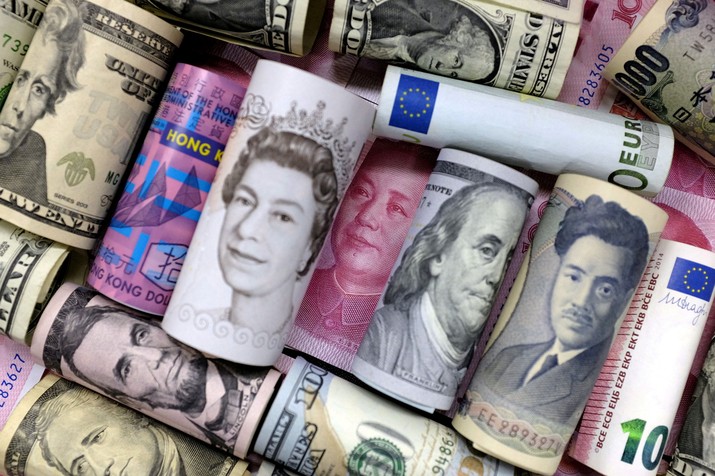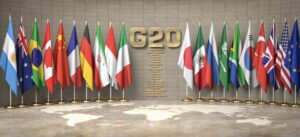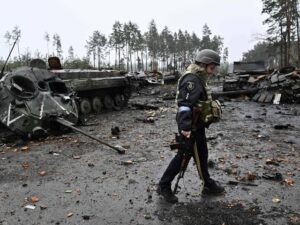
STRATEGIC ASSESSMENT. U.S. Secretary of State Antony Blinken demanded Russia allow grain shipments out of war-battered Ukraine during closed-door G20 talks in Bali on Friday, a Western official said. “To our Russian colleagues: Ukraine is not your country. Its grain is not your grain. Why are you blocking the ports? You should let the grain out,” said Blinken, according to a Western official present.

Blinken has refused to meet Russian Foreign Minister Sergei Lavrov but addressed Russia during the talks and laid out U.S. financial assistance to ease global food shortages triggered by the war in Ukraine, a major source of global grain and corn exports. “Russia is the source of the problem, the United States is focused on solutions,” Blinken said, according to the official.
Moscow says it would allow Ukrainian ships loaded with food products to leave if the Ukrainian military demined its ports, an option rejected by Kyiv, which fears for the safety of its Black Sea coast.
Lavrov meanwhile said Friday he would not chase after the United States for talks as his counterpart Antony Blinken declined to see him at a G20 meeting in Bali. “It was not us who abandoned contact; it was the United States,” Lavrov told reporters. “We are not running after anybody suggesting meetings.”
Foreign Minister Retno Marsudi after the G20 Foreign Ministers Meeting said the food and energy crises will have a significant impact on developing countries, particularly low-income and small island countries.

As a solution, many G20 FMM participants supported the UN Secretary General’s efforts to provide a safe passage for delivering food and energy products from Russia and Ukraine, including through ports.
The meeting also discussed commitments to explore further G20 collaboration to strengthen food and energy security, including through the UN system and other international organizations.
Foreign Affairs Minister Retno Marsudi on Sunday clarified about the walkout of Russian Foreign Minister Sergei Lavrov at the G20 FMM in Nusa Dua, Bali on Friday (7/8). She confirmed that Lavrov had indeed left, but returned to join the forum. “Lavrov returned to the meeting venue. I had a one-on-one bilateral meeting with Lavrov between the first and second sessions,” said Retno. She said that at the beginning of the second session, Lavrov was present and when he was going to leave earlier, he stopped by Retno’s table to say goodbye.
Russian Foreign Minister Sergei Lavrov on Friday decided to walkout from the G20 Foreign Ministers Meeting in Bali. Lavrov left the morning session before German Foreign Minister Annalena Baerbock criticized Moscow for its invasion, as well as the afternoon session before Ukrainian Foreign Minister Dmytro Kuleba spoke at a virtual forum, and was absent when U.S. Foreign Secretary Antony Blinken condemned Russia, according to diplomats. Lavrov claimed that Western partners were attempting to avoid discussing global economic challenges by criticizing Russia instead.

International Monetary Fund (IMF) Managing Director Kristalina Georgieva urged Indonesia as G20 president and China as the world’s largest creditor to encourage other G20 countries to accelerate debt reduction measures for poor countries with difficulty paying their debts. Georgieva said it was important to start the G20 Common Framework agreed with the Paris Club official creditors in October 2020. Georgieva urged President Jokowi to push for a bigger deal on this debt issue before the G20 Heads of State and Government Summit in November.
Bank Indonesia (BI) Governor and Economic Affairs Coordinating Minister Airlangga Hartarto opened the 2022 Indonesian Digital Financial Economy Festival (FEKDI) on Monday, which was held live streaming with the theme “Advancing Digital Economy and Finance: Synergistic and Inclusive Ecosystem for Accelerated Recovery”.
This event is also a side event in the series of G20 Finance Track: Finance and Central Bank Deputies’ (FCBD) Meeting and the Third Finance Ministers and Central Bank Governors’ Meeting (FMCBG) in Nusa Dua, Bali. Minister Airlangga estimated the value of Indonesia’s e-commerce transactions in 2021 would reach IDR401 trillion.
Airlangga said that Indonesia is now the most popular digital investment destination in Southeast Asia, representing 40 percent of the total investment which reached IDR300 trillion, thus, it is not surprising that the development of the digital economy is one of the main strategies for transforming the Indonesian economy.
Finance Minister Sri Mulyani Indrawati said the G20 Indonesia Presidency would encourage financial institutions and Micro, Small, and Medium Enterprises (MSMEs) to get access to finance and a larger market.
She said that Indonesia’s G20 presidency could foster global partnerships for financial inclusion by providing infrastructure such as payment systems and regulations that are compatible across borders. She added the government is still working to achieve President Jokowi’s target of 90 percent domestic financial inclusion by 2024.
Based on the Indonesian Political Indicators (IPI) survey, the majority of Indonesian people in the survey are unaware that Indonesia would hold the G20 presidency in 2022. Only 30 percent of respondents claimed to know that Indonesia is hosting the High-Level Conference and serving as the G20 Summit’s president in November 2022.
At the State Palace on Wednesday, President Jokowi urged G20 countries to set aside their differences and continue working toward a peaceful solution to the war in Ukraine, as the lives of billions could be on the line if the conflict persisted and disrupted the supply of basic foodstuffs.
He also called on the forum’s foreign ministers — who are scheduled to meet later this week in Bali — to work out a solution that could help ease access to food for millions who are currently facing a shortage of grain and cereals as a result of Russia’s ongoing invasion of the European country. “The lives of millions if not billions of people, mostly in Africa and Asia, could be at stake if these grains are not released,” Jokowi said to journalists.
G20 finance leaders will meet in Bali this week for talks on issues like global food security and soaring inflation, but there was skepticism from Germany and France over Indonesia’s hopes for common ground as tensions over Ukraine simmer.
Germany is expecting more open and direct discussions with Russia this time around, government sources said in Berlin on Wednesday. “Most will want to adopt a different approach on the day, after April,” one of the sources added.
But the source put a damper on hopes of agreement on a joint communique following the talks, sought by host Indonesia, saying Russia and China were expected to band together amid tensions with the West over the Ukraine war. A French Finance Ministry source also said the G20 ministers were unlikely to agree on all issues for a communique, with the economic consequences of the war particularly disputed.
G20 finance leaders will meet in Bali this week for talks that are due to include issues like global food security and soaring inflation, as host Indonesia tries to ensure frictions over the war in Ukraine do not blow discussions off course. Indonesia hopes to issue a communique when talks wrap up on Saturday though its central bank governor said the meeting would be summarized in a chair’s statement if that is not feasible.
Finance Minister Sri Mulyani Indrawati held a bilateral meeting with her Chinese counterpart Liu Kun on the sidelines of the Third G20 Finance Ministers and Central Bank Governors’ Meeting on Tuesday, where the two ministers discussed the G20 priority agenda and current global challenges such as inflation, food crisis, and energy crisis. Minister Sri Mulyani lauded China’s support in establishing a mechanism of the Financial Intermediary Fund (FIF). “The Indonesian G20 presidency has pushed for the FIF mechanism for health management under the management of the World Bank, where WHO will also play an important role in this mechanism,” she said in a statement on Wednesday.
US Treasury Secretary Janet Yellen on Thursday said Russian President Vladimir Putin’s war against Ukraine was causing a negative spillover around the world and Russian officials had no place at this week’s meeting of the Group of 20 major economies.
Speaking at a news conference on the sidelines of a G20 meeting of finance officials, Yellen called on the global community to hold Russia accountable for the war and its dramatic impact on energy prices and rising food insecurity.
Yellen dodged a question about whether she would walk out when Russian officials spoke, as she and other Western leaders did during the last such meeting in Washington in April, but said she would condemn Russia’s invasion of Ukraine “in the strongest possible terms.”
In a press conference in Bali on Thursday, the U.S. Secretary of Treasury Janet Yellen praised Indonesian Finance Minister’s leadership to advance critical work of the G20. Yellen said during the challenging time for the global economy the U.S. and other G20 countries saw the fruits of the efforts as the World Bank Board approved the creation of a critical new fund to fill gaps in pandemic preparedness and prevention. She also announced that the United States will provide $450 million as an initial contribution to help launch this important financing mechanism.

Russia’s war in Ukraine poses the greatest threat to the global economy, U.S. Treasury Secretary Janet Yellen said on Thursday, as G20 ministers prepare to start talks in Bali. “Our greatest challenge today comes from Russia’s illegal and unprovoked war against Ukraine,” she said ahead of a finance ministers and central bank governors’ meeting on Friday and Saturday. “We are seeing negative spillover effects from that war in every corner of the world, particularly with respect to higher energy prices and rising food insecurity,” she said.
Treasury Secretary Janet Yellen said she would pressure China to restructure loans to countries that face unsustainable debt burdens during the meeting of finance ministers from the Group of 20 major economies this week. During a press conference in Indonesia, Yellen said she hoped that China would work with Sri Lanka to restructure its debt, a push that she said she would pursue more broadly during the meetings.
Finance Minister Sri Mulyani Indrawati and her U.S. counterpart Janet Yellen have agreed that the impact of unresolved geopolitical issues is the reason behind the ongoing food and energy crises. “This is considering that the various impacts caused by the conflict in Ukraine have been one of the triggers for the continued soaring of world energy prices and pose challenges to the global economy,” Minister Sri said in an official statement issued here on Saturday.
To overcome this, various policy options need to be explored so that global oil supplies are maintained and world oil prices can return to pre-conflict levels, she added. Sri said that the handling of the food and energy crises must be accelerated since everyone has the right to access affordable food and energy. Therefore, her ministry will discuss the U.S. proposal on the need for discussion with the relevant ministers dealing with the energy sector.
The Group of 20 major economies’ finance chiefs on Saturday pledged to address global food insecurity and rising debt but made few policy breakthroughs amid divisions over Russia’s war in Ukraine at a two-day meeting in Indonesia.
With questions growing about the effectiveness of the G20 in tackling the world’s major problems, U.S. Treasury Secretary Janet Yellen said the differences had prevented the finance ministers and central bankers from issuing a formal communique but that the group had a “strong consensus” on the need to address a worsening food security crisis.
Host Indonesia will issue a chair’s statement instead. Finance Minister Sri Mulyani said most topics were agreed upon by all members except for particular statements about the war in Ukraine. She described it as the “best result” the group could have achieved at this meeting.
Said Yellen, “This is a challenging time because Russia is part of the G20 and doesn’t agree with the rest of us on how to characterize the war,” stressing that disagreement should not prevent progress on pressing global issues.
Finance Minister Sri Mulyani Indrawati called on Friday for the Group of 20 to take concrete action to tackle ongoing food and energy crises and appealed to member countries to engage in more discussion and less politics amid the escalating global impact of the war in Ukraine.
Sri Mulyani, on behalf of G20 host Indonesia, expressed concern about the global energy crisis and growing food insecurity resulting from surging commodity prices and supply shortages induced by Russia’s invasion of Ukraine, noting that the issues were threatening the recovery from the pandemic and macroeconomic stability. She reminded member countries that expectations for the meetings were high and that a failure to reach their objectives would result in dire consequences, especially for low-income countries.
Commitments for the financial intermediary fund (FIF) for pandemic prevention, preparedness, and response (PPR) have now reached nearly $1.28 billion (IDR19 trillion), Finance Minister Sri Mulyani Indrawati said during a press conference on the outcome of the 3rd G20 FMCBG Meeting in Nusa Dua, Bali, on Saturday.
The funding commitments came from the United States, the European Commission, Germany, Indonesia, Singapore, Britain, Welcome Trust, and the Bill and Melinda Gates Foundation. The additional funding commitments made at the 3rd G20 FMCBG meeting came from Italy, China, the United Arab Emirates, Japan, and South Korea.
When G20 finance ministers and central bank governors met in Bali on July 15-16, the summit raised hopes of coordinated action to tackle some of the thorniest issues facing the global economy. Those hopes withered over the weekend as divisions over the war in Ukraine scuppered any chance of a joint communique to address mounting challenges including soaring inflation, slowing economic growth and widespread shortages of food and goods.
The summit’s rare failure to produce a communique, instead publishing a 14-paragraph “chair’s summary,” augurs poorly for the prospect of consensus at the headline G20 leaders’ summit in November. Indonesian Finance Minister Sri Mulyani Indrawati said the decision to scrap the planned communique was “a challenging and difficult situation” and a source of regret.
Bank Indonesia (BI) Governor Perry Warjiyo, in a press conference on Saturday, said that one of the concrete steps achieved by G20 countries at the third meeting of the G20 Finance Ministers and Central Bank Governors (FMCBG) in Bali was further regulations regarding crypto transactions. Perry said crypto assets pose a variety of new risks that can affect the stability of the monetary economy and financial system.
Foreign Affairs Minister Retno Marsudi opened the Youth 20 Summit in Jakarta on Monday. The event involved 72 delegates from 18 countries, and discussed digital transformation, youth employment, diversity and inclusion, and the sustainability of a livable planet. The results of the summit will be submitted to the world leaders at the G20 Summit.
State-owned oil company PT Pertamina on Monday offered G20 member countries opportunities to invest in Indonesia’s energy transition towards net zero emissions by 2060. President Director Ahmad Yuniarto said the company has an installed capacity development roadmap for the next five years to prepare geothermal as the base load for new and renewable energy in Indonesia.
Indigenous and women’s rights groups in Indonesia are protesting against the G20’s headline event for gender equality over the alleged exclusion of local voices and failure to address key women’s issues in North Sumatra. Activists gathered at the site of the W20 Summit in Lake Toba, North Sumatra on Wednesday to call attention to deforestation and other issues they say have been neglected by the event taking place from 19-21 July.
“I think the W20 narrative is ironic when their theme is ‘recover together’ equally, but they didn’t even include any agenda related to the challenges of the women of Lake Toba, especially regarding land grabbing and customary forests,” Sekar Banjaran Aji, a campaigner for Greenpeace Indonesia, told Al Jazeera (Red/many sources).





